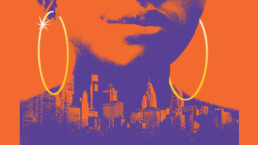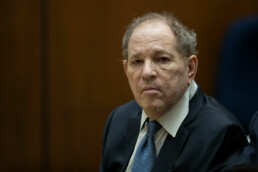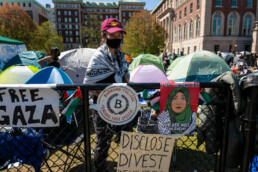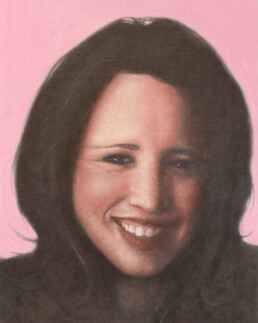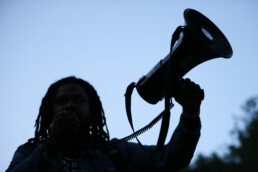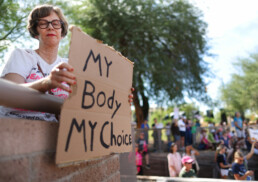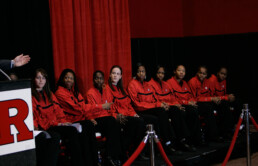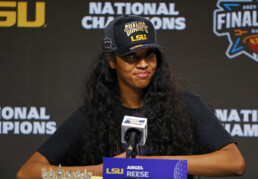The Inside Woman at the Obama White House
Social secretary Deesha Dyer is sharing her real life behind the scenes—her imposter syndrome, her abortion, and what she wants young Black women to know.
BY REBECCA CARROLL
Back in 2009, as a 31-year-old part-time community college student inspired by the election of America’s first Black president, Deesha Dyer applied on a whim for a White House internship. Much to her astonishment, she got it. She went on to become the White House social secretary during the last two Obama years, curating large-scale events, meeting royalty, the Pope, and her hip-hop heroes. She managed her spectacular successes while fighting off a severe case of imposter syndrome and dealing with the daily microaggressions a Black woman faces in the historically whitest of houses. Dyer tells her extraordinary story in her new memoir, Undiplomatic: How My Attitude Created the Best Kind of Trouble, and we sat down to talk about all of it.
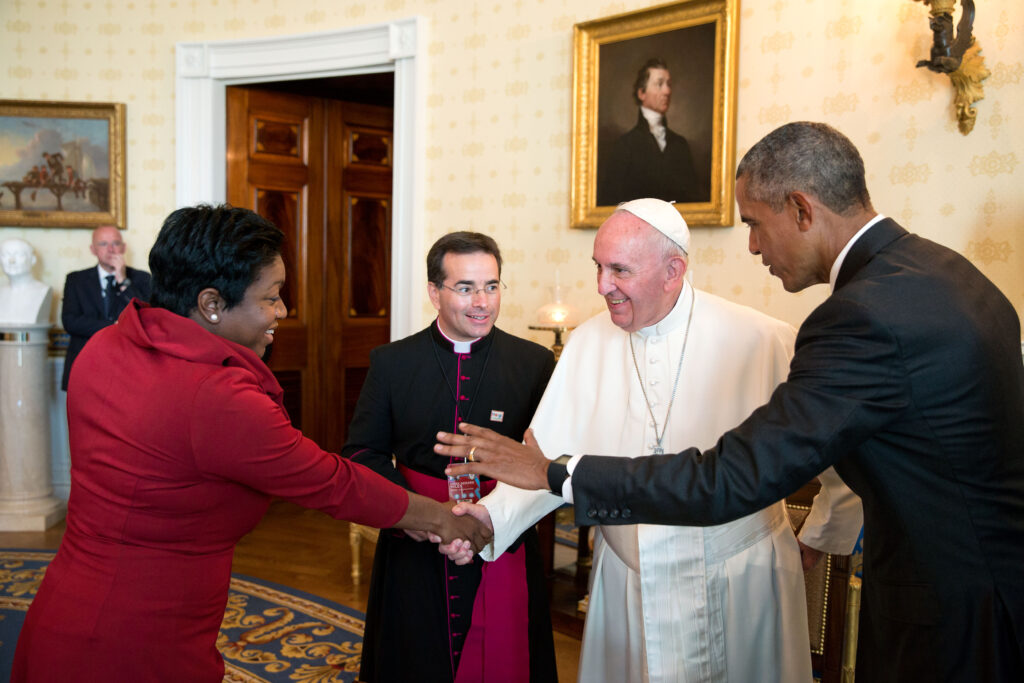
Rebecca Carroll: For many people, but especially for Black folks, the Obama years were not just an eight-year presidency; they were an era, like the Harlem Renaissance or the Black Arts Movement. It was a collective glory. What was it like to be such an integral part of that?
Deesha Dyer: What made it so wonderful for me is that I wasn't in this world before, so I had no preconceived notion. The same wonder I had when I started encountering [Barack Obama] on my television in 2007 was the same way I was for eight years.
Yes, they were President and First Lady, but also they were Barack and Michelle Obama—community activists, Black folks who had student loans at some point. It was an everyday tussle in my head of being like, “Remember, they're President and First Lady; they're not just Barack and Michelle.” I wanted to look at them as regular people, but I had a job to serve them. And they are people that I respect and revere. To this day, sometimes Barack Obama will joke with me, and in my head, I'm like, “Oh my God, I’m living this moment, I'm a witness to this,” and it's just a joy.
In your book you write that you identified with President Obama’s non-traditional family background. Can you talk a little bit about why that is?
Number one, we always saw white presidents—but also, when I got to know Barack Obama's background, it was just like, “He didn't have a mom and dad both in the home; he lived with his sister, and he lived in Hawaii. He moved around, so it wasn't like this cookie-cutter background.” [Dyer spent most of her childhood away from her parents while she attended a boarding school for low-income students.] And I had that excitement like, “He understands what some of us go through…This person will maybe get some things that are not traditional.”
One of the very real joys of your book is its realness and humor. When you write about your interview with Mrs. Obama for the job of social secretary, and she asks you how you’re doing—I mean, you were all of us when you said in your head: “I am out here fighting for my life!”
I’m fighting for my fucking life! Like, “What do you mean how am I? How would you be sitting here for an interview with Michelle Obama?! How would you be sitting with yourself? Clearly, I'm not okay.” I can see it like it was yesterday.
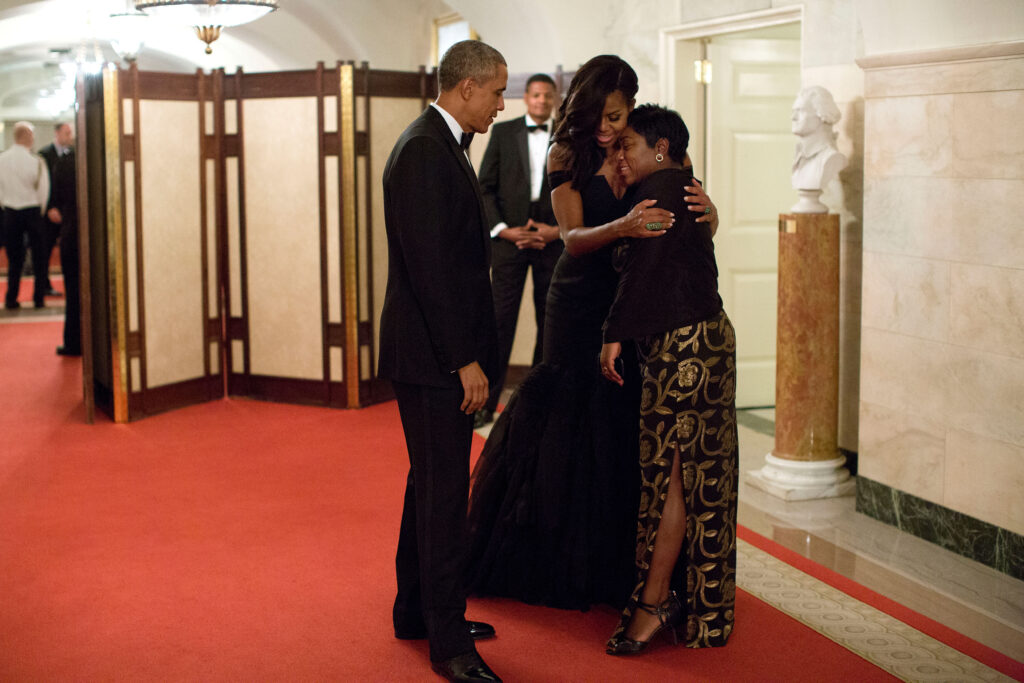
Were there other instances with Mrs. Obama that you left out of the book and might want to share?
Oh, there were millions. But [she] would always tell me to tell my story. One time, we were in Miami, and I was working, so I wasn't at the dinner table. She said, “Deesha, come over here, sit down, and tell them your story.” And I'm like, “Erm.” I knew her friends, but I held a very clear distinction: If I'm working, I ain't drinking. I'm over here. When y'all leave, that's when I'll eat and drink, right?
We had a lot of just small moments, fun moments, laughing moments. She's a human being, but she's also one of these people that—you prepare for a meeting with and think you’ve thought of everything, and she asks the one thing you didn't think of.
You write very candidly about having had two abortions, one while you were working at the White House—ironically, you wrote, just after you met the Pope. You say that that second abortion ended up being kind of a breakthrough in your life. Did that surprise you?
It really did, because I was still very thick in the imposter syndrome: “I'm a fraud, blah, blah, blah.” When I had the abortion, there were no regrets. I've always been on the side of reproductive rights. I had a medical abortion, so I did it at home. But I went back to work when I was still bleeding and wearing Depends. And I was just like, “What the literal fuck am I doing here with a fucking diaper on? This is crazy.” That breakthrough for me was huge because I just couldn't believe that I thought I had to go back to work wearing a diaper after an abortion.
Because if you didn't, it would further fuel your sense of fraudulence?
One hundred percent. The culture of work is different now than it was then, and I think I was afraid somebody would be like, “Why is she taking [time] off?” And so, I was like, “I'm going to go back just to prove I can do it.” Because when you're in your fraudulence, you do anything to prove that you can handle it. Which is why we see Black women in the workplace with hair loss, diabetes, high blood pressure, and strokes: because we're trying to prove that we're not a fraud, that we're supposed to be there, that we can handle it.
It's the way in which imposter syndrome is so symbiotic with the historical stereotypes that have been put upon us.
Say that! I know that we've come very far with mental health and workplace culture, but please. If a Black woman is like, “I'm going to take some time off,” when you come back, it’s like, “Are you okay?” Treating me like I'm a child. I never really [encountered] anybody who did that in the White House, but it still was the White House. It was still people [who did not believe] I could do the job. And so, I thank goodness something didn't happen to me because I would’ve probably died for that job. For what? Now, I'm like, “No.”
We were talking earlier about your abortion—how surreal is it now to think about having had an abortion while at the White House, which is two miles from the Supreme Court where Roe was overturned?
I'm not surprised, especially given the last President [and his] Supreme Court justice [appointees], but I would say I'm angry. I'm angry in a way that makes me have to watch my wellness. As somebody who's had abortions and somebody who has a fucking vagina and ovaries and everything else, it's kind of just like, “How are we so discounted that we can't make our own decisions?” It's the reason why I talk about [my abortion] in the book: I want people to understand that abortion is a normal thing. We have sex, and [if] we don't want to have children, we have abortions. Let's move on.
But did I think we would ever be here? I don't think I did. But when Trump came, I knew it was a possibility. I remember running to my OBGYN and getting my IUD because I knew what was going to happen. I got it in February 2017 before I lost my federal health insurance, and I was like, “Let me get the real good one, the one that will last through his presidency.”
By the way—and I don’t know if this is a spoiler or not—but I didn’t realize that the whole Melania Trump bringing a gift for Mrs. Obama on the “transition of presidential power” day was an act of defiance. Everybody saw Melania step out of the car holding a blue Tiffany’s box, and that it was immediately awkward when she handed it to Mrs. Obama, but you write that you had actually confirmed with Trump’s team that there wasn’t going to be a gift exchange.
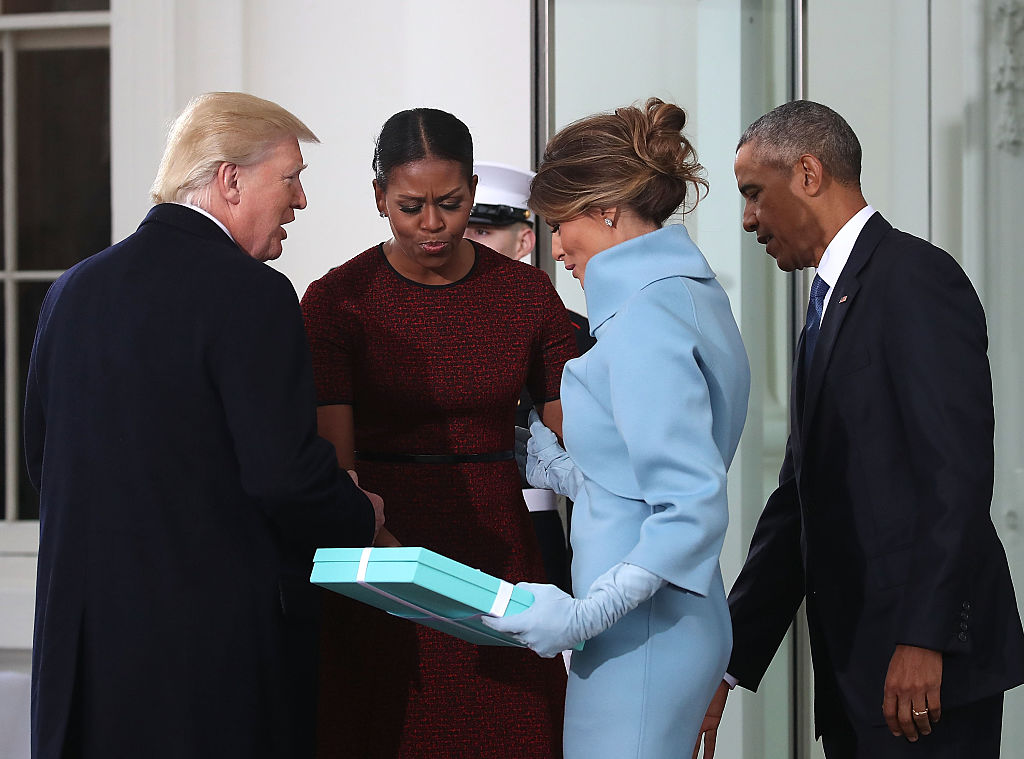
Yeah, we confirmed that there were no gifts coming. Otherwise, we would've planned for me to be right there so she got it. But you could see on Mrs. Obama's face like, “Damn.” Legit like, “What's happening? What are we doing here?” I think that was [the moment] for me when I was like, “I'm done. This is it for me. These people have lost their everlasting fucking minds.” How do you come up here with a fucking Tiffany's box? Are we sponsored by Tiffany’s? But it was also so on-brand for them.
I understand what you mean by on-brand, but even so, why do you think [Melania Trump] would do that?
I'm going to be for real. I don’t think Mrs. Trump had a clue. I honestly think she had no idea about the protocol. I think she was shocked to be there. I think they were both shocked to be there for all four years. I think maybe they knew where the White House was, but that's about it. I don't think that they had any idea [about protocol], but their team should have known.
In keeping with our idea of fighting and wellness, your story includes a lot about your “unexpected path,” and I wondered how your definition of an expected path has changed since you worked in the White House.
My definition has changed in the sense that I don't have one anymore. But I think that the world's definition is still the same. There aren't a lot of companies that are going to hire somebody with great experience and no college degree [as the Obamas did with me].
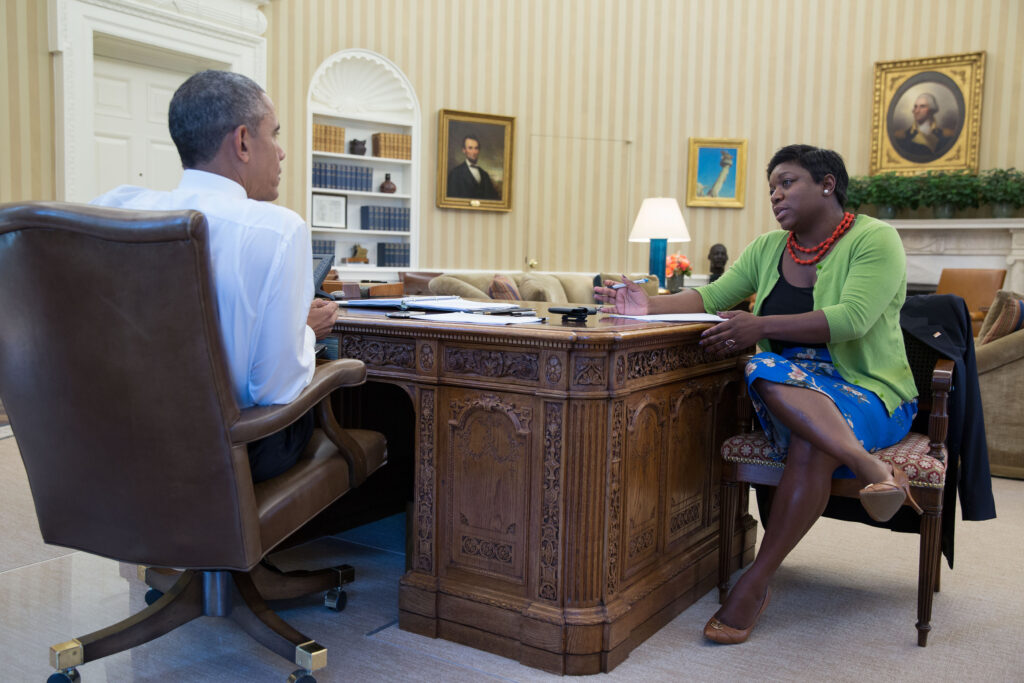
Just to bring it full circle: Towards the end of the book, you write about an experience you had after the White House where you thought you had this new gig you’d applied for in the bag, but you didn’t get it. You were very hard on yourself about that, and I thought you could have been kinder.
The first thing I did [when I didn’t get the job] was go back to the comfortable place of, “You did that all wrong.” [That experience] did knock me down, but it didn't keep me down. Before, I would be like Eeyore; I would just wallow in it. But [this time], I was like, “Okay, let me wallow. All right, let's go get a drink.” I want to be real with people; I'm not going to pretend that I don't still have these [feelings of doubt] that come and go. But I know how to manage it better, and I think that I am more kind to myself.
But this also goes back to the whole notion that Black women are only recognized if we’re Beyoncé or Breonna Taylor— either a superwoman or a statistic. It's like, can we have some middle ground?
Can we just exist? And in any which way we want to? Sometimes we want to be a superhero, and then sometimes we're like, “No, I want to sit at home and watch movies all day.” For so long, I thought [that desire] was me being lazy or wrong. No, fuck that. Now I'm laying in this bed, child.
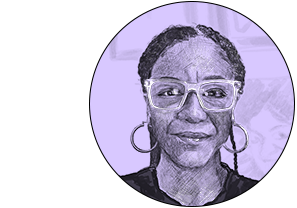
Rebecca Carroll is a writer, cultural critic, and podcast creator/host. Her writing has been published widely, and she is the author of several books, including her recent memoir, Surviving the White Gaze. Rebecca is Editor at Large for The Meteor.
How Harvey Weinstein's NY Conviction Was Overturned
 April 25, 2024 Evening, Meteor readers, What. A. Day. In today’s newsletter, we look at Harvey Weinstein’s overturned conviction and how it happened. Plus, SCOTUS’s latest post-Dobbs case, a heartwarming story from across the pond, and our weekend reading list. Literally appalled, Shannon Melero  WHAT'S GOING ON“Not a fair trial:” I bet no one had this on their 2024 Bingo card: The New York Court of Appeals has overturned Harvey Weinstein’s 2020 conviction for felony sex crimes. The key factor? That jurors in the case heard testimony from women who had accused Weinstein of sexual assault, but who were not named in the specific case being tried. (More than 100 women have charged that Weinstein abused them, but the case itself involved only two women.) Jan Ransom of the New York Times explains that the additional witnesses “testified about their encounters with Weinstein under a state law that allows testimony about ‘prior bad acts’ to demonstrate a pattern of behavior. But the [appeals] court in its decision on Thursday said that ‘under our system of justice, the accused has a right to be held to account only for the crime charged.’”  THE "SILENCE BREAKERS" IN LOS ANGELES AFTER WEINSTEIN'S GUILTY VERDICT IN 2020. FROM LEFT TO RIGHT: CAITLIN DULANY, ROSANNA ARQUETTE, JESSICA BARTH, LAUREN SIVAN, SARAH ANNE MASSE, LAURA O'CONNOR, LOUISE GODBOLD, AND LOUISETTE GEISS. (VIA GETTY IMAGES) Advocates and lawyers argue that establishing a pattern of how predators operate has become common in assault cases. And for good reason: It’s helped overcome the longtime tendency of juries and the public to think that survivors are making it all up. This wasn’t the first case to use additional testimony to show that an accused abuser had a pattern of abusing; prosecutors successfully marshaled additional survivor witnesses in the Bill Cosby and Donald Trump assault cases, among others. The 4-3 decision in favor of Weinstein was determined by a panel of judges, the majority of whom were women—though two senior judges, Shirley Troutman and Caitlin Halligan, recused themselves from the case over the winter and were replaced. But Weinstein is not walking free: His 2022 rape conviction and 16-year prison sentence in the state of California still stands. While lawyers determine whether or not the New York case will be retried, Weinstein will be moved from upstate New York to California to serve his time there. No matter what happens next, this overturn has reopened a wound for sexual assault survivors everywhere. As one of Weinstein’s accusers, Katherine Kendall, told the Times, “It’s a terrible reminder that victims of sexual assault just don’t get justice.” Where lawyers play doctor: Yesterday, the Supreme Court heard its first round of oral arguments determining whether the Emergency Medical Treatment and Labor Act, or EMTALA, is still applicable in states with abortion bans. If you want a concise and spicy explainer on that, my third-favorite co-worker, Mik, has you covered. TL;DR: EMTALA dictates that anyone, regardless of their condition or ability to pay, is entitled to life-saving medical treatment in an emergency room. The Biden administration clarified right after Dobbs that this treatment includes abortion care—often crucial in cases where pregnant people are bleeding out or experiencing other complications. But some states, like Idaho, are being all, “Not in our house!” So now, the Supreme Court is being asked just how close to death a pregnant person has to be before a doctor can step in and save their life. The good news—which shockingly exists—is that so far, SCOTUS does appear to be seeing some reason in this case. US Solicitor General Elizabeth Prelogar argued that “It would be no different if the state had come out and decided to ban epinephrine,” a necessary medication for severe allergic reactions. Even conservative Justice Amy Coney Barrett was skeptical, suggesting “that Idaho had little reason to challenge the federal government’s EMTALA enforcement,” The 19th reports. (Broken clocks….) The decision will come down in early summer. In the meantime, check your voter registration and read up on which state legislators you can vote out of office. AND:
 THE UNDEFEATED, "INVINCIBLE" MEMBERS OF QUEENS PARK LADIES! (VIA INSTAGRAM)  CLICK THE LINK ABOVE TO GET YOUR UNIQUE SHARE CODE TO SEND TO A FEW FRIENDS. IF FIVE OF THEM SIGN UP FOR THIS NEWSLETTER, YOU GET A METEOR TOTE! ALREADY HAVE A CODE BUT CAN'T FIND IT? NO WORRIES, IT'S WAITING FOR YOU DOWN BELOW ⬇️
 WEEKEND READING 📚On heartbreak: Over 25,000 children in Gaza have been killed or injured since October. “That’s one child every 10 minutes,” NPR reports. Nimer Saddy al-Nimer, a 12-year-old boy shot while looking for food, shares his story. (NPR) On the meaning of words: What is everyone getting wrong when it comes to the conversation around famine? An expert weighs in. (Slate) On the dollar: There’s a larger uncomfortable truth behind Caitlin Clark’s historic $28 million Nike deal. And it isn’t just about money. (The Washington Post)  FOLLOW THE METEOR Thank you for reading The Meteor! Got this from a friend? Subscribe using their share code or sign up for your own copy, sent Tuesdays, Thursdays, and some Saturdays.
|
![]()
What the Columbia Protests Teach Us
 April 23, 2024 Shalom, Meteor readers, Happy Passover to those who celebrate and a felicitous Tuesday evening to those who don’t. Religious fun fact for you! There probably wouldn't be a Passover were it not for two very smart and brave women: Jochebed and Miriam, mother and sister of Moses. They really don’t get enough credit for saving Moses’ life, ya know. In today’s newsletter, we take a look at the student-led protests across college campuses and find out what stay-at-home parents are really ✌️worth ✌️. Shannon Melero  WHAT'S GOING ONTents on campus: Over the last week, an increasing number of student groups on college campuses across the country have staged major protests calling attention to the ongoing attacks on Gaza and demanding the schools’ administrations divest from Israel. Students at Yale, NYU, MIT, and Columbia have been arrested; at Columbia, where over 100 students were arrested—some temporarily evicted from their dorms—faculty walked out, objecting to the fact that the university president had called the NYPD.  STUDENTS WITH THEIR TENTS AT THE COLUMBIA ENCAMPMENT (VIA GETTY IMAGES) A lecturer from the law school told the Guardian that the police presence felt “completely unnecessary” and that “this was by all accounts a non-violent protest.” Not all students (from various campuses) agree: One student from the University of Michigan told CBS, “It's scary, it's terrifying. The sign says, 'Long Live the Intifada' ... not a comfortable feeling.” But student organizers at Columbia released a statement saying, “We firmly reject any form of hate or bigotry and stand vigilant against non-students attempting to disrupt the solidarity being forged among students—Palestinian, Muslim, Arab, Jewish, Black, and pro-Palestinian classmates and colleagues who represent the full diversity of our country.” (It’s also worth noting that Columbia’s own Human Rights Institute released a statement confirming that the protests were non-violent.) If like the students at the Columbia encampment last night you find yourself marking Passover at a protest or at home with family or friends it is a unique time to be doing so, considering the holiday’s deep roots in the struggle for liberation and lessons on mercy to outcast peoples. One Passover tale involves flinging the door open and declaring “All who are hungry come and eat!”—poignant words in the face of Gazans’ forced starvation. As Rabbi Elliot Kula wrote in TIME, “Solidarity is not just a pretty word, but a powerful tool we need to leverage in this time.” AND:
 FOLLOW THE METEOR Thank you for reading The Meteor! Got this from a friend? Subscribe using their share code or sign up for your own copy, sent Tuesdays, Thursdays, and some Saturdays.
|
![]()
They Waved Her Underwear in Front of a Jury and Called Her a "Slut Puppy"
April 19, 2024NEWS,FEATURED STORY
THEY WAVED HER UNDERWEAR IN FRONT OF A JURY AND CALLED HER A "SLUT PUPPY"
Now Brenda Andrew is on death row, and the Supreme Court could weigh in
BY NEDA TOLOUI-SEMNANI
The U.S. Supreme Court will decide this Friday if it will hear the case of Brenda Andrew, the only woman currently on death row in Oklahoma. The Andrew case is the second Oklahoma capital punishment case vying for the court’s attention this term, and it has potentially far-reaching ramifications—not just for the state, but for the rights of women and queer people everywhere.
The background on the case is this: Andrew, along with James Pavatt, her former partner, were found guilty of first-degree murder in the 2001 shooting death of Andrew’s estranged husband, Rob, but the jury rejected the state’s charge that Andrew would be a “continuing threat to society.” Nonetheless, both Andrew and Pavatt were sentenced to death. Throughout Andrew’s 2004 trial, her sexuality, her dress, her demeanor, and, ultimately, her behavior as a wife, mother, and Christian were dissected and condemned. In an amicus brief filed with the Supreme Court, a former federal judge, 17 law professors, and four domestic violence advocates argue that the Andrew case was rife with gender bias that unfairly prejudiced the jury against her.
“At a time when women’s rights generally are on the chopping block—also the rights of queer people and civil rights of minority communities—we’ve got a case that’s at the extreme end of what it means when we dehumanize these communities when we strip people of their humanity,” says Nathalie Greenfield, a lawyer with the non-profit firm Phillips Black, which filed the writ of certiorari to the Supreme Court on Andrew’s behalf. She argues that if the Supreme Court does not review the case, the justices would sanction using “assumptions, stereotypes, and tropes about people who dare to transgress perceived norms,” especially when it comes to gender, race, and identity.

The trial transcript, for example, reveals that witnesses were encouraged to describe Andrew’s appearance in detail, from her dresses (“very tight, very short, with a lot of cleavage,” said one) to her make-up choices (“gothic”), and also to say whether they thought those choices were appropriate. Prosecutors also waved Andrew’s underwear in front of the jury and called her a “slut puppy,” one of the last things members of the jury heard before they began to deliberate.
“There [were] just so many recorded instances of gendered evidence being presented every single day [of the Andrew trial],” says Greenfield. “And a lot of this was about her appearance and her extramarital affairs. The focus was on the fact that this was a woman who was transgressing gender norms by not being this chaste Christian wife.”
Oklahoma is a particularly deadly state: It has executed 124 people since 1976, when the U.S. lifted its moratorium on capital punishment. (Only Texas has killed more people.) Of these, just three were women—two of whom were prosecuted by district attorney Bob Macy, who is considered the second deadliest prosecutor in United States history. He’s responsible for 54 death sentences—more than any other prosecutor who was practicing law between 1980 and 2001. He resigned in 2001 after evidence of prosecutorial misconduct was found in 18 of those 54 cases, resulting in three exonerations.
However, his shadow still stretches over Oklahoma’s justice system—and Macy’s assistant district attorney and protege, Fern Smith, was a prosecutor in the Andrew case. According to transcripts, Smith repeatedly asked witnesses to describe Andrew’s dress, opine over Andrew’s behavior, and state whether or not Andrew was, in Smith’s words, a “good mother.”
This isn’t the first time a case Smith has prosecuted has been challenged. She has been repeatedly accused of failing to disclose exculpatory evidence—evidence that could be favorable to the defendant—and even of destroying evidence. In fact, she was accused of prosecutorial misconduct by name in the case of Richard Glossip, the other Oklahoma capital punishment case that will be in front of the U.S. Supreme Court this year.
At a time when women’s rights generally are on the chopping block—also the rights of queer people and civil rights of minority communities—we’ve got a case that’s at the extreme end of what it means when we dehumanize these communities when we strip people of their humanity.
The Supreme Court has already delayed deciding whether to hear Andrew’s case twice. Tomorrow, they could do one of three things: agree to hear it, decline to hear it, or “vacate and remand,” which means the Supreme Court could return her case to the appellate court to reconsider without hearing an oral argument.
Since Andrew was sentenced, she has been the sole woman on death row; consequently, she has served the majority of her sentence—more than 16 years—in solitary confinement. According to the United Nations, prolonged solitary confinement, or more than 15 days without meaningful human contact, is defined as torture.
In February 2020, Andrew was moved to the general population, where, according to her lawyers, she thrived. She got a job and joined a quilting circle. In January, two days after her attorneys filed the writ of certiorari with the Supreme Court, Andrew was returned to solitary. She wasn’t given a reason.
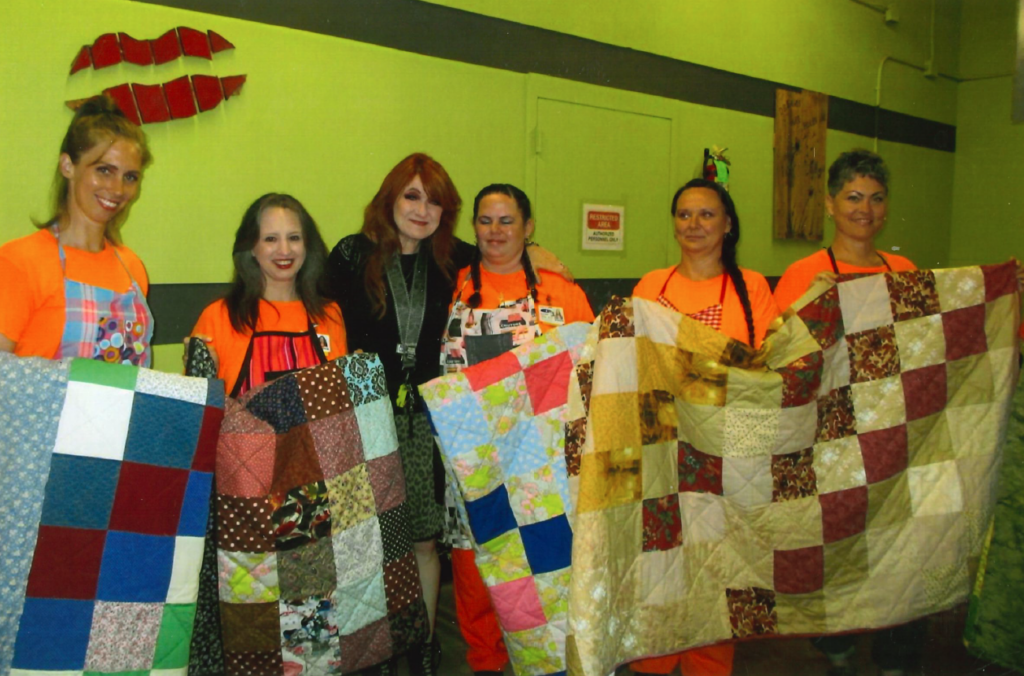
“The gender bias is just so finely woven into the trial that you can’t extricate it,” argues Jessica Sutton, another attorney with Phillips Black. “It’s unique in that way. However, the real issue implicates the due process clause of the 14th Amendment. We have to ensure that trials are fundamentally fair. We want to make sure that, for the ultimate punishment, we have a reliable trial, a reliable process, a reliable conviction, and sentencing. What the prosecution did is undermine every aspect of the entire trial.”

Neda Toloui-Semnani is an Emmy-winning journalist and the author of They Said They Wanted Revolution: A Memoir of My Parents.
Slut-shamed In a Courtroom
|
Evening, Meteor readers, Tomorrow is a big day for a large portion of the population. Of course, I am talking about the release of Taylor Swift’s “Tortured Poets Department.” To prepare, I have broken up with my husband so I can really feel all of the feelings Taylor wants me to feel. It’s going to be great.  In today’s newsletter, Neda Semnani examines the “slut puppy” case the Supreme Court is deciding whether to take. Plus the pro-Palestinian protestors who just lost their jobs and some recommendations for your weekend. “All’s fair in love and poetry,” Shannon Melero  WHAT'S GOING ON
 THIS WEEK AT SCOTUSNow Brenda Andrew is on death row, and the Supreme Court could weigh inBY NEDA TOLOUI-SEMNANI  A PORTRAIT OF BRENDA ANDREW PAINTED BY EMILY DAVIS ADAMS The U.S. Supreme Court will decide this Friday if it will hear the case of Brenda Andrew, the only woman currently on death row in Oklahoma. The Andrew case is the second Oklahoma capital punishment case vying for the court’s attention this term, and it has potentially far-reaching ramifications—not just for the state, but for the rights of women and queer people everywhere. The background on the case is this: Andrew, along with James Pavatt, her former partner, were found guilty of first-degree murder in the 2001 shooting death of Andrew’s estranged husband, Rob, but the jury rejected the state’s charge that Andrew would be a “continuing threat to society.” Nonetheless, both Andrew and Pavatt were sentenced to death. Throughout Andrew’s 2004 trial, her sexuality, her dress, her demeanor, and, ultimately, her behavior as a wife, mother, and Christian were dissected and condemned. In an amicus brief filed with the Supreme Court, a former federal judge, 17 law professors, and four domestic violence advocates argue that the Andrew case was rife with gender bias that unfairly prejudiced the jury against her. “At a time when women’s rights generally are on the chopping block—also the rights of queer people and civil rights of minority communities—we've got a case that's at the extreme end of what it means when we dehumanize these communities when we strip people of their humanity,” says Nathalie Greenfield, a lawyer with the non-profit firm Phillips Black, which filed the writ of certiorari to the Supreme Court on Andrew’s behalf. She argues that if the Supreme Court does not review the case, the justices would sanction using “assumptions, stereotypes, and tropes about people who dare to transgress perceived norms,” especially when it comes to gender, race, and identity.  BRENDA ANDREW AS A YOUNG WOMAN (IMAGE COURTESY OF PHILLIPS BLACK) The trial transcript, for example, reveals that witnesses were encouraged to describe Andrew's appearance in detail, from her dresses (“very tight, very short, with a lot of cleavage,” said one) to her make-up choices (“gothic”), and also to say whether they thought those choices were appropriate. Prosecutors also waved Andrew’s underwear in front of the jury and called her a “slut puppy,” one of the last things members of the jury heard before they began to deliberate. “There [were] just so many recorded instances of gendered evidence being presented every single day [of the Andrew trial],” says Greenfield. “And a lot of this was about her appearance and her extramarital affairs. The focus was on the fact that this was a woman who was transgressing gender norms by not being this chaste Christian wife.” Oklahoma is a particularly deadly state: It has executed 124 people since 1976, when the U.S. lifted its moratorium on capital punishment. (Only Texas has killed more people.) Of these, just three were women—two of whom were prosecuted by district attorney Bob Macy, who is considered the second deadliest prosecutor in United States history. He’s responsible for 54 death sentences—more than any other prosecutor who was practicing law between 1980 and 2001. He resigned in 2001 after evidence of prosecutorial misconduct was found in 18 of those 54 cases, resulting in three exonerations. However, his shadow still stretches over Oklahoma’s justice system—and Macy’s assistant district attorney and protege, Fern Smith, was a prosecutor in the Andrew case. According to transcripts, Smith repeatedly asked witnesses to describe Andrew’s dress, opine over Andrew’s behavior, and state whether or not Andrew was, in Smith’s words, a “good mother.” This isn’t the first time a case Smith has prosecuted has been challenged. She has been repeatedly accused of failing to disclose exculpatory evidence—evidence that could be favorable to the defendant—and even of destroying evidence. In fact, she was accused of prosecutorial misconduct by name in the case of Richard Glossip, the other Oklahoma capital punishment case that will be in front of the U.S. Supreme Court this year. The Supreme Court has already delayed deciding whether to hear Andrew’s case twice. Tomorrow, they could do one of three things: agree to hear it, decline to hear it, or “vacate and remand,” which means the Supreme Court could return her case to the appellate court to reconsider without hearing an oral argument. Since Andrew was sentenced, she has been the sole woman on death row; consequently, she has served the majority of her sentence—more than 16 years—in solitary confinement. According to the United Nations, prolonged solitary confinement, or more than 15 days without meaningful human contact, is defined as torture. In February 2020, Andrew was moved to the general population, where, according to her lawyers, she thrived. She got a job and joined a quilting circle. In January, two days after her attorneys filed the writ of certiorari with the Supreme Court, Andrew was returned to solitary. She wasn’t given a reason.  BRENDA ANDREW, SECOND FROM LEFT, AND MEMBERS OF HER QUILTING CIRCLE (IMAGE COURTESY OF PHILLIPS BLACK) “The gender bias is just so finely woven into the trial that you can't extricate it,” argues Jessica Sutton, another attorney with Phillips Black. “It's unique in that way. However, the real issue implicates the due process clause of the 14th Amendment. We have to ensure that trials are fundamentally fair. We want to make sure that, for the ultimate punishment, we have a reliable trial, a reliable process, a reliable conviction, and sentencing. What the prosecution did is undermine every aspect of the entire trial.”  Neda Toloui-Semnani is an Emmy-winning journalist and the author of They Said They Wanted Revolution: A Memoir of My Parents. Neda Toloui-Semnani is an Emmy-winning journalist and the author of They Said They Wanted Revolution: A Memoir of My Parents.  FOLLOW THE METEOR Thank you for reading The Meteor! Got this from a friend?
|
![]()
SCOTUS Just Made Protesting Much Harder
|
Evening, Meteor readers, Before we get any further away from the afterglow of March Madness, I must congratulate our top bracketologist, Em, who is getting a brand-new Meteor tote. They had this to say about their unexpected victory when I contacted them with the news: In today’s newsletter, we dig into a ruling targeting protest organizers, talk more basketball, and share a warning about the importance of oxygen. Looking forward to the regular season, Shannon Melero  WHAT'S GOING ON Freedom of assembly? Not for everyone: If you’re a protest organizer in Mississippi, Texas, or Louisiana, your life got a lot more complicated last Friday after the Supreme Court declined to hear a lower court case out of Louisiana: Mckesson v. Doe. The case is super layered, so let’s break it down. The question at the heart of the case, which was first heard in the Fifth Circuit Court of Appeals, is whether or not a protest organizer can be held financially liable for the actions of an attendee who does something illegal. The organizer named in the suit is DeRay Mckesson, the famed blue-vest-wearing Black Lives Matter activist (and podcast host) who organized a protest outside a Baton Rouge police station in 2016. During the action, a police officer was struck by a rock thrown by an unknown person who was present. There is no evidence that Mckesson himself injured the police officer; the accusation is that he created an environment that allowed for the officer to be injured. In the eyes of the conservative Fifth Circuit, Mckesson is financially liable for the illegal actions of this unknown assailant. But the legal logic to justify that is…loose. Under a 1982 court ruling in the case of NAACP v. Claiborne Hardware, protest organizers can only be held liable if evidence finds that they incited illegal activity through speech or authorized illegal action by attendees. But adhering strictly to that ruling would have let Mckesson off the hook, so the Fifth Circuit—with six Trump appointees—went further by adding an extra (intentionally vague) rule to the list of ways organizers can be found liable. According to this court, “The First Amendment does not apply ‘where a defendant creates unreasonably dangerous conditions, and where his creation of those conditions causes a plaintiff to sustain injuries.’” Because Mckesson’s protest blocked access to a police station and a public highway (a very common tactic in direct actions), he created “unreasonably dangerous conditions” and is therefore liable. As one judge on the Fifth Circuit who wrote a dissenting opinion on the ruling noted, the decision would unfairly make organizers liable for “the unlawful acts of counter-protesters and agitators.” Without action from SCOTUS, the ruling won’t be overturned, and any future organizer in Texas, Mississippi, or Louisiana will face great financial risk for anything that happens at their protest. While this doesn’t all-out ban protesting, it certainly makes it much harder to organize. The move couldn’t come at a worse time. Protestors have taken to the streets over abortion rights, trans rights, and climate change over the last year, and just yesterday, protestors in California, Oregon, and New York blocked major roads to call for a ceasefire in Gaza. If you’re organizing a protest over any issue and want to know your rights, learn more here. AND:
 CLARK AND WNBA COMMISSIONER CATHY ENGELBERT (VIA GETTY IMAGES)
 FOLLOW THE METEOR Thank you for reading The Meteor! Got this from a friend?
|
![]()
Christine Blasey Ford, In Her Own Words
April 13, 2024NEWSLETTER,FEATURED STORY
 April 12, 2024 The author of a new memoir on retaliation, recovery---and the survivors who reached out to herBY CINDI LEIVEFive and a half years ago, psychology professor Christine Blasey Ford raised her right hand before the 21-person Senate Judiciary Committee and became, despite her best attempts otherwise, a public figure. Her testimony that then-Supreme Court nominee Brett Kavanaugh had sexually assaulted her when they were both in high school—that he had covered her mouth so violently that “I thought that Brett was accidentally going to kill me” and laughed while doing it—riveted the country in one of those moments that felt like history even as it was happening. On one level, we all know what happened next: Kavanaugh railed angrily, protestors took to the streets, and after a brief delay, he was confirmed while the sitting president mocked Dr. Ford ruthlessly. But what happened next to the woman at the center of the hearings—and what led her to that day? Those are the questions Dr. Ford answers in her new memoir, One Way Back, an account of everything before, during, and after her testimony.  DR. FORD BEING SWORN IN FOR HER TESTIMONY. (VIA GETTY IMAGES) I’ve known Dr. Ford for a few years, and thus have had a glimpse of the dual role she plays in mid-2020s America. To me—and I’m guessing to most of you—she’s a hero, someone who respects the integrity of this country’s highest offices so much that she sacrificed her own privacy, comfort, and security for them. To the radical right, though, she’s a target—so much so that death threats (“I want to see you three feet under, six feet under…” she says) have been a constant in her life, and she’s had to hire security to protect her family. After she appeared alongside Professor Anita Hill on The Meteor’s podcast Because of Anita two years ago, I got a call from a political operative hissing ominously, “She was told to keep her mouth shut.” I’m so happy she hasn’t. Her book is full of secrets and grief and Capitol Hill betrayals, but also sun and surf and heavy metal and the voice of the actual human behind that blue suit and raised right hand. We talked by phone two weeks after her book came out. Cindi Leive: You once told me that when you thought about writing a memoir about testifying, you thought of those kids’ books that can be read two ways—like you read it in one direction, and then turn it upside down and it’s a different story. What were those two ways that you thought about your own experience? Christine Blasey Ford: I think for the first two or three years post-testimony, I was torn between two books I could write: One would be why you must do this, with all the benefits [of coming forward about assault], and the other would be why you should never do this—about all the forces that are working against you, and all of the costs. For a long time, I was in a place of experiencing the retaliation and costs. That's why I chose not to write for so long. I knew that my first attempt would not be helpful to anyone. I think it was at the five-year mark that I began to feel that it was part of history, not part of current events. For me personally, it felt like it was enough in the rearview mirror that I could try to write something that honored that, yeah, this is life-changing, and there was a cost, but there's also a bunch of benefits that you don't really see while you're making the life changes. You and I met through a project focused on the more than 100,000 letters you got after you testified. And I remember you saying at first that you thought to yourself, Why are they writing me? Didn't they see the end of the movie? Meaning—that [Kavanaugh] was confirmed anyway… The first letters I read were [written] during the week of the paused investigation between the hearing and the vote, where [the FBI] was going to supposedly look into things a little deeper and do an extended background check. And those letters were really hopeful—and I felt bad for them considering how it ended [with no extensive investigation and a swift confirmation] because their hopes had been raised. And then, with the letters that came after, I just felt like, “I bet a lot of this mail is people who are feeling sorry for me.” I felt like I had missed a game-winning field goal or made an own goal in a game. [Laughs] But then, when I really looked through the letters…yes, people felt bad for me, but that's not really why they were writing. There was an amazing benefit happening for survivors watching the testimony: They wrote that they were inspired to make more clarified decisions about whether they wanted to come forward or not about their own assault or they wanted to share it with someone else. And I grapple with the fact that all of that came because I didn’t get my way that the hearing be kept private. It was televised, and even though it turned my life upside down, it benefited so many people. Wait, pause on that. You write that you didn’t actually realize it would be televised…you thought, “Maybe it'll be on C-Span, but who the hell watches C-Span?” [Laughs] I mean, I was walking down the hallway like, “Oh, it's a work day. No one's going to watch this. My friends are all really hard workers, and they have class and they have responsibilities. I'll catch them up on it when I get back.”  MILLIONS OF PEOPLE STOPPED TO WATCH DR. FORD'S TESTIMONY. (VIA GETTY IMAGES) Cut to me sobbing in front of my television in Brooklyn, along with practically every other woman in the country. Right. During my first break, I really realized the magnitude of people who were watching it because I looked at my phone and had more text messages than I had ever collectively received. “Good job!” “You're doing great!” [Laughs] I was like, “How do they know?” But if it had gone the way you had anticipated—like, one camera for the archives somewhere in a basement—then these 100,000 people wouldn't have been able to make meaning in their own lives…And that process of “meaning-making,” I learned from you, is an actual psychological phenomenon. I didn't understand it until my student at the time—Elizabeth Michael, who's now a doctor of psychology—explained it to me: People change their emotions and cognitions based on hearing or viewing someone else's experience. And I still was in a pretty rough patch in my life, so I wasn't really understanding…so she placed it in the context of television and movies. If you're watching a TV show and you're relating to some character, there's this small shift and identification and validation that's happening about your own thoughts and feelings. It starts to open up something in your own mind to think about. I'm wondering if you want to share a couple of the specific letters that moved you… All of the things that people made by hand or knitted—almost every day, I could wear an item of clothing, whether it's socks or gloves or a shirt or a scarf, or blankets, that people made. The simple thank you’s were beautiful in their own right—and then there were 10-page letters from people sharing what they had been through themselves. And also the offers! Like Otis from Texas, offering his truck for my family to move in, and people from all over the country saying, “You can come stay at our place. We have a cabin!” Like, who would open their door to a stranger? A lot of people, apparently. You’ve said that survivors in their 70s and 80s wrote you to say that they'd never talked about their own experiences before. What was it like to read those letters? I felt for them—and I felt like I could have easily been one of them and gone the rest of my life without really talking about this. I was on a different path once the Supreme Court was in play—I felt the value of that institution was more important than me. But those letters were really hard to read at the beginning. Then I adapted, and I feel like I have a new role, which is to be a recipient of those stories and to honor them. That’s also what happens to me any time I go out in public: People come up to me and want to tell me what happened to them. They’ve identified me as a safe person to speak to about their story. At first, that role was really overwhelming. And now, it's an honor. I'm honored to be that person.  DR. FORD SIGNING HER MEMOIR FOR A READER AT A GATHERING IN LOS ANGELES. (PHOTO BY MAYA JOAN) You and Anita Hill have a lot in common. And you talked about this when you were on the Because of Anita podcast two years ago, but part of your common experience is that in both of your cases, Congress failed to do a full investigation. And in your case, we later learned that the FBI had received 4,500 tips at the time of the hearing and shared them with the White House, at which point nothing happened. First of all, how have you let go of being, like, so damn angry about that? Because it's hard for me to even say those words aloud and not be pissed. That was really quite something. And the public didn't learn about [the failed investigation] until, like, two years after the testimony. But we sort of knew that right away. So it was, for me, bundled up in the grief immediately after the vote and the FBI not coming to interview me and my corroborators. And the logistics involved—where the executive branch is overseeing the FBI, so they're the ones deciding whether they want to look at those tips or not. The process was the most disappointing part about it. The outcome was less disappointing than the process. You write that you've moved into the phase of “radical acceptance,” but how would you like to see the process work for people who might come forward with information that should be heard in the future? I'm concerned that people won't come forward, given the process that they've witnessed. I think in the workplace and in other settings where you have H.R. and Title IX and other protections, it's maybe a little bit safer—a little bit more defined, at least. And in [most] workplaces, you're not allowed to retaliate. And so I think that, at minimum, we need to make sure that there's no retaliation against people for speaking up in a government setting. I think we're better than that. One of the most moving scenes in the book is during the summer of 2018 when you’re deciding how to come forward with what you know about [then-nominee Kavanaugh]. And your older kid is kind of intuiting what's happening but doesn't totally know…. He was noticing my behavior was a lot different at the beach that summer—I was talking to my friends excessively, and we were very serious and focused rather than relaxed. We were on a very tight timeline: The president had said that there was going to be a nominee selected in one week, and when Brett was on the shortlist that week, I was certainly just behaving differently. And kids pick up on these things, so he asked about it a few times. I kept it as simple as possible and said, “Someone that I know from high school who did something really bad to me is being considered for a really important job by the president, and I need to let him know.” When I first told him, he said, “Well, that's really nice.” He said it with a tad of confusion. And then, the next day, he came back to me and had thought about it, and he said he probably had an idea of what might have happened to me and that he was really sorry. What a loving response. That’s what you’d want to hear from anyone. He’s a great kid. I'm really lucky. And in my mind, it was like, “Oh, now I can go forward. He's okay with it.” What you went through in 2018 left such a long shadow over the last five years for you. And I'm curious: What are the moments where you feel like you can be liberated from thinking about all of that and just be you? Minimalism is now my new way of being, and I've just found that really helpful—to reduce the complexity of life, for now. That's where I feel like I can be myself: outside or in the ocean or just among a small group of friends. So not in the mosh pit at a Metallica concert? Oh, there, too. There too.  ABOUT CINDI LEIVECindi Leive is the co-founder of The Meteor, the former editor-in-chief of Glamour and Self, and the author or producer of best-selling books including Together We Rise. Her related listening recommendation: Anita Hill and Christine Blasey Ford, in conversation for the first time here.  ENJOY MORE OF THE METEOR Thanks for reading The Saturday Send. Got this from a friend? Sign up for your own copy and The Meteor’s flagship newsletter, sent on Tuesdays and Thursdays.
|
![]()
Ye Olde Abortion Ban Hits Arizona
|
Greetings, Meteor readers, I’m in for Shannon today, so you’ll have to wait until next week for your sports (and the results of our March Madness bracket, which she very much wants to announce personally). Today, we’re talking about that Ye Olde Arizona abortion ban in the Grand Canyon state, what O.J. Simpon should be remembered for, and a few weekend reads. Fare thee well, Samhita Mukhopadhyay  WHAT'S GOING ONHistory lessons: On Tuesday, the Arizona Supreme Court revived a zombie law from 1864 that would ban nearly all abortions in the state. The law stipulates that “a person who provides, supplies or administers to a pregnant woman, or procures such woman to take any medicine, drugs or substance” for the purpose of abortion could be prosecuted unless the pregnant person’s life is at risk. The current Attorney General of Arizona, Kris Mayes, has courageously said she will not prosecute people under what she has called a “draconian” law. Meanwhile, former gubernatorial candidate/current Senate candidate/die-hard election denier/Trump superfan Kari Lake, who enthusiastically endorsed this law during her governor bid, appears to be trying to distance herself from it. (I wonder why?) In trying to make sense of the resurrection of a law written before slavery was abolished or women had the right to vote, we talked to our resident abortion storyteller, historian, and host of “The A Files,” Renee Bracey Sherman.  A PROTESTOR AT A WOMEN'S MARCH RALLY IN ARIZONA (PHOTO BY MARIO TAMA/GETTY IMAGES) The Meteor: What is something about Arizona law and its roots in the Civil War era that you feel the average person is not fully grasping? Renee Bracey Sherman: I think many people are upset because we can see how different society is today from how it was in 1864. Black people were not considered full humans. There were laws against interracial marriage. Most of us couldn’t own property—in fact, we were property in the eyes of the law. Anyone can look around and see that we should not be using this standard to regulate our society—let alone medical care—so it feels outrageous. But Arizona is not the only state like this. When Roe was overturned, several states automatically reverted to their abortion bans from the 1800s. That part isn’t new, and people live under those laws now. What feels surprising for Arizona is that unlike Michigan, which took the opportunity to repeal their outdated laws, or Wisconsin, which is currently challenging theirs, the Arizona State Supreme Court thought [the law] could be implemented now. It’s like they didn’t look outside and check the temperature of our nation. They ignored the clear message from the last few elections that people want access to abortion. You noted that by today's standards, the original law would technically ban second- and third-trimester abortions, but it's being used to ban abortion completely. How is it possible that the law isn't being interpreted as it was written but can still be revived today? Courts are made up of people who make decisions—sometimes bad ones. They don’t have to follow the historical accuracy of the law. Everything is based on their interpretation. Not to mention: language changes. Regina and I talk about these language changes on our podcast. What we consider an abortion today—the intentional termination of a pregnancy—and when [that abortion] is possible is because we now have the ability to detect a pregnancy earlier than we did 160 years ago. But back then, [abortion laws] generally referred to the ending of a pregnancy after “quickening,” or the moment when the pregnant person could feel the fetus move, which is during the second trimester. So, one could argue that the law should only be applied to later abortion, but again, it’s up to the Court’s interpretation. And that doesn’t help us because a ban on any aspect of abortion is a ban for all of us. This is why abortion should not be left up to the courts and must be decriminalized and available for everyone throughout pregnancy. What happens next for Arizonans? What can we do to fix all of this? The advocates on the ground are doing a lot right now. They have two weeks to challenge the State Supreme Court’s ruling before it goes into effect. Abortion funds and clinics are trying to care for as many patients as they can and figure out whether they would like to continue providing care in defiance of the State Supreme Court’s ruling. State legislators are looking to try to repeal the ban but so far have been unsuccessful. The Governor and Attorney General are looking at all of the options they have at their disposal. Advocates are currently gathering signatures for a statewide ballot measure protecting abortion in the state constitution, so we’ll see how that plays out over the summer and into November. And, of course, all of this is complicated by voter disenfranchisement, which Regina and I talk about in our podcast interview with LaTosha Brown. But at the end of the day, while these are important fixes, it’s not addressing the larger issue that abortion decisions and care should not be left up to the government, courts, or popular vote to decide. As we rebuild, we need to envision a way to protect abortion access for everyone that isn’t dependent on a few judges and their inability to understand historical context or society today.  O.J. SIMPSON IS SHOWN DURING TESTIMONY IN HIS CRIMINAL TRIAL FEBRUARY 9, 1995. (PHOTO BY LEE CELANO/WIREIMAGE) O.J. Simpson’s real legacy, as told by bell hooks: There is going to be a lot of ink spilled about the passing of football star O.J. Simpson, who was acquitted of killing his ex-wife Nicole Simpson and her friend Ron Goldman almost 30 years ago. Simpson’s low-speed car chase and subsequent trial was a cultural flashpoint: Would a black man accused of killing a white woman be able to win in our racist criminal justice system? This was the narrative invoked by legal mastermind Johnie Cochran to convince the nation that a man who had allegedly abused his wife was not her killer. But Black feminists didn’t fall for it: bell hooks said to Charlie Rose in a 1995 interview that she hadn’t watched the trial, but while America made it about race, at its core, Simpson’s trial was also about upholding the patriarchy. “Once this becomes entertainment, once the cameras focus on O.J. Simpson,” she said, “people will forget that at the heart of this is both male violence and male violence against women.” AND:
 WEEKEND READS 📚On babies: Women are having children later. What does it mean? (TIME) On throuples: Three literary stars found love together. And now they are having a baby. (New York) On feminist history: In light of O.J. Simpon’s death, writer Moira Donegal re-upped this must-read Andrea Dworkin essay on Nicole Simpson’s murder. (Evergreen Review)  FOLLOW THE METEOR Thank you for reading The Meteor! Got this from a friend?
|
![]()
Before Caitlin Clark and Dawn Staley…
 April 8, 2024 Hey there, Meteor readers, Happy Monday! We're bringing you a short and sweet send today to start your week off right. Our offices will be closed tomorrow in observance of Eid al-Fitr, the holiday that marks the end of Ramadan (and also Shannon's fast). Happy eclipse, Samhita Mukhopadhyay  WHAT'S GOING ONA terrific run: A historic season of college women’s basketball came to a close yesterday when South Carolina’s Gamecocks emerged victorious in an undefeated (39-0!) season over the Iowa Hawkeyes. You’ve probably seen the numbers: Twelve million viewers watched last week’s match between Iowa and LSU, with its infamous (and media-invented) rivalry between Caitlin Clark and Angel Reese. As The New Yorker reported over the weekend, that game had more viewers than any Major League Baseball game, almost every college basketball game, and any game in the NHL from the last year. “More people watched the women play…than watched any regular-season college football game last year, except for Ohio State versus Michigan,” Louisa Thomas wrote. And all that happened not because of some tremendous new influx of marketing money but despite a longtime lack of investment in women’s sports. Iowa’s Caitlin Clark—who broke the record as the NCAA Division I all-time leading scorer and was all over your TV with her ads for Nike, Gatorade, and State Farm—had something to do with the viewership, of course. South Carolina head coach Dawn Staley, winning her third title yesterday, thanked her personally in her emotional victory speech, saying, “She carried a heavy load for our sport, and it’s not going to stop here on the collegiate tour. When she’s the No. 1 pick in the WNBA draft, she’s going to lift that league up as well.”  But this was not a one-woman show—far from it. Staley herself is a GOAT: as a player, as a coach, and as a voice for diversity on the court. Last week, she said she believes trans women should be allowed to play the sport. (Nonetheless, the National Association of Intercollegiate Athletics voted today to ban transgender women from competing.) She also issued a powerful call for racial justice in the summer of 2020, writing, “People are mad because NOTHING HAS CHANGED.” Beyond Staley and beyond Clark, there were thousands of other reasons this season shone: the players of NCAA hoops and the audiences who are truly ready for them. This generation of viewers grew up playing sports (or seeing their sisters and daughters do so)—they get it, marketing budgets or not. Like the T-shirts say: Everyone watches women’s sports. And while you’re watching, we have an incredible story on the In Retrospect podcast this week. It’s about the 2007 Rutgers women’s basketball team, which 17 years ago this month had a Cinderella season, powering their way to the Final Four in an extraordinary triumph. But instead of being celebrated, they were attacked by popular radio host Don Imus, who used racist slurs to describe them. (That kind of racism is alive and well, as the conversation this season about Angel Reese reminds us.) Hosts Susie Banikarim and Jessica Bennett revisit the 2007 season with two women who were there: former Rutgers captain and WNBA star Essence Carson and journalist Jemele Hill, who reported on the story in real time. Hill told them, “To see how it went from people celebrating them to them just being degraded in the next moment—it was disheartening, to say the least. I just really felt for those young people because they had achieved something really, really spectacular, and it just felt like the moment was stolen from them.”  THE 2007 RUTGERS TEAM AT A PRESS CONFERENCE IN NEW JERSEY HELD IN RESPONSE TO DON IMUS'S COMMENTS. (VIA GETTY IMAGES) AND:
 KRISTIN DAVIS, SARAH JESSICA PARKER, CYNTHIA NIXON, AND KIM CATTRALL IN SATC PROMO IMAGE FROM 2000 (VIA GETTY IMAGES)
 FOLLOW THE METEOR Thank you for reading The Meteor! Got this from a friend?
|
![]()
Let's Give Angel Reese Her Flowers
|
Evening, Meteor readers, Remember a few newsletters ago when I promised I’d stop hammering everyone with my basketball opinions? I lied! In today’s newsletter, we’re giving Angel Reese her flowers. Plus Rebecca Carroll talks to model Cameron Russell about her new book and impossible beauty standards. Untruthfully yours, Shannon Melero  WHAT'S GOING ONBigger than basketball: Watkins. Clark. Bueckers. Reese. Over the last month, these women have been at the center of conversation about the future of women’s basketball and just how bright and exciting it is. They’ve been called icons, broken scoring records, and, in the case of Angel Reese and her LSU Tigers teammates, derided as villains. Reese, a 21-year-old Black woman from Baltimore, Maryland, announced in Vogue yesterday—after LSU’s exit from the tournament Monday—that she's entering the 2024 WNBA draft. Reese is one of college basketball’s best players, but despite that, she has been made out to be this year’s Big Bad, partly due to her media-invented rivalry with Caitlin Clark. (Monday’s rematch between Clark and Reese brought in over 12.3 million viewers) Reese has been subject to scrutiny that goes beyond her in-game performance—every word she utters is overanalyzed—and sometimes overshadows her role in LSU's climb to the Elite 8. There is a palpable hatred that follows her—one that she says has resulted in death threats that began in 2023 when the Tigers won the NCAA Championship. Why are so many people hostile towards this young basketball player? I’ll explain it in the simplest terms possible: They hate her 'cause they ain't her. Angel Reese is talented; she’s a workhorse; and pardon my French, but she is so fucking entertaining to watch. She is an artist. She is a showman. But Reese is not hated for those traits. People hate her because she knows she is good and is unapologetic about it. Ahead of the Iowa game, Reese placed her signature crown on the bench for all to see and crowned herself when stepped on the court. Boss shit. She is a Black woman who does not dull her shine and people simply cannot abide by that energy.  ICONIC. (VIA GETTY IMAGES) The day after LSU’s loss, sportscaster Emmanuel Acho delivered an entire monologue about Reese crying at the post-game conference, saying on air, “In sports, you can’t act like the big bad wolf, then cry like Courage the Cowardly Dog.” He followed it up with a tweet saying his analysis was meant to be “gender neutral and racially indifferent.” But the premise of that argument is that Reese is a “self-proclaimed” villain who switched up her persona because she lost. It’s an argument without legs. Her villain persona was entirely invented by the media—specifically the LA Times article that referred to LSU as “dirty debutantes” and America’s “basketball villains.” (The reporter has since apologized for the article.) Once that article came out and Reese was being peppered with questions about it she said, “If that’s what you want me to be, I guess I’ll take that.” Acquiescence is not self-proclamation. Moreover, Acho willfully ignored everything behind Reese’s tears: The loss, the year of death threats, the end of her college career—all of that had to be bottled up simply because “villains don’t get empathy.” The hatred and language aimed at Angel Reese cannot be divorced from her race or gender simply because it’s more convenient to view her as a character. Especially because sports media wouldn’t apply that same language to Caitlin Clark who is just as brash and unapologetically talented as Reese. Black women have always been subject to a different degree of scrutiny than white women playing the same sport. Reese already explained this to us last year: “I don’t fit the box that y’all want me to be in. I’m too hood. I’m too ghetto. Y’all told me that all year…So this is for the girls that look like me. For those that want to speak up for what they believe in. It’s unapologetically you.” And two years before that, even Paige Bueckers (who is white) spoke up about the mistreatment of Black women by sports media. Sports villains are not uncommon or inherently evil, it’s normally just part of the storytelling. Kobe, Larry Bird, Michael Jordan—they all had a villain era. But Reese’s treatment goes beyond just Villain of the Day. It is shaped by the same assumptions that are made about Black women and women of color in any field they excel in—constantly having people belittle your greatness to make you easier to stomach. Despite the racism and misogynoir they’ve faced, though, the women of this year’s NCAA Tournament have given us an incredible month and I’m sure this weekend’s Final Four and Championship games will be appointment television. And when it’s all over, and the confetti clears, we’ll be turning our eyes to the WNBA draft (April 15th!), where Angel Reese is projected to be a top-ten pick. I hope when she’s chosen she brings her crown and that million-dollar smile. AND:
 IN THE EYE OF THE BEHOLDERReclaiming Our BeautyOne model's coming of age in a broken systemBY REBECCA CARROLL  CAMERON RUSSELL (VIA GETTY IMAGES) We live in a beauty-obsessed culture—and nowhere has that been made more clear than in the modeling industry, which for decades promoted the image of thin, white women as the definitive standard. But behind every image is an actual person navigating a workplace where objectification is a part of the job. Cameron Russell started modeling when she was a teenager. After a few years, she saw tremendous success—booking campaigns with Victoria’s Secret and H&M and doing runway work for Prada and Chanel. She began to use her voice early on with a widely publicized TED talk in 2013. Then, in 2016, Russell and Chinese-English model Áine Rose Campbell co-founded the Model Mafia, a collective of models whose unifying mission is to create “a more equitable, just and sustainable fashion industry and world.” Russell’s work with the collective would prove to be preparation for her role in the #MeToo movement. After allegations of sexual assault emerged against Harvey Weinstein in 2017, a model friend texted Russell about her own experience of sexual abuse on the job. Russell offered to post her friend’s text on Instagram without identifying details—and that post launched a domino effect, as hundreds of similar stories from fellow models flooded Russell’s DMs and inbox. She posted many of them under the hashtag #MyJobShouldNotIncludeAbuse, and, almost overnight, became an outfacing public envoy for a reckoning in fashion. Soon after, she resolved to write her own story. In her new memoir, How to Make Herself Agreeable to Everyone, Russell reflects on her deeply personal evolution in the industry and her choice to get loud about its all too often seedy underbelly. Rebecca Carroll: I want to start with an experience you write about after one of your first modeling jobs as a teen. Your mom asks you how it went and then says, “Were you your charismatic, confident self?” I wonder what that meant to you then and what it means to you now? Cameron Russell: I grew up feeling—and I only identified this retroactively as a feminine labor—that being charismatic and likable was a necessary skill that [my mom] wanted me to have. As a child, I felt very much connected to voice—my ability to tell stories and to be in conversation with people. When I started modeling, no one really wanted to hear me talk. You go to a casting and they’re like, “No, actually, we don’t really want to hear about your day.” A lot of women’s work—which I include charisma, agreeability, and grace—is supposed to be something that we are and not something that we do. Your story is also very much about a social consciousness awakening. In your TED Talk, you talk about how hard it was to unpack “a legacy of gender and racial oppression.” When did that unpacking begin for you? I was a fairly thoughtful, politicized, and aware teenager when I arrived in this industry. The awakening or the consciousness shift that happened was to come into an understanding of how change is made and also move away from being heavily invested in certain ideas of success. In the book, you talk about reading memoirs by other models because you wanted to see what happens when a model finds herself and is no longer “a doe-eyed teen.” As a transracial adoptee, this reminded me of what we call “the fog,” which is the moment we realize for the first time that we have been deprived of our origin culture and community. It’s both enraging and freeing and a call to action. What were the most liberating and intentional actions you took after finding yourself? One piece that felt so liberating was reading Iman's memoir and just finding this very clear, concise, and complex read of her own position in fashion as complicit, as harmed, as racialized, as colonized—all these really complex things that she articulates very simply. The narrative that I had been fed for many years was that every casting agent and every media outlet would say, “Oh, you're so exceptional. You have beauty and brains,” which actually serves to make you very lonely and reinforces a winner-take-all system that is reliant upon gendered exploitation of labor from top to bottom. In reading Iman’s memoir, I was able to see I'm not alone. Your husband is Black, and so your children are Black. One of your kids is a daughter who is going to grow up to become a Black woman, and she will face the white standard of beauty, and the white gaze that was and is so pervasive in the modeling industry. How do you hope to help her think about these things? Femininity, as I have experienced it, [is] complicated. It has been so commercialized, I always [think], “Ugh, that performance of gender feels so yucky to me.” But actually, why? It can be beautiful. It can be beautiful to be adorned; it can be beautiful to be all the different things that we associate with feminine beauty when they're not in the context that I learned them. And so I hold that for her. She's only two and a half. We were at Target the other day, and all she wanted to do was to be in the bow aisle. So she wanted the beads for her hair, she wanted the rainbow elastics. We got home, and she said, “I want 10 bows. I want four blue beads.” And so, I am adoring her adoration of her own body, beauty, and expression. That’s really lovely. And finally, towards the end of the book, you say that you need to believe that you are better than the conditions that made your success possible. What does that belief look and feel like for you on a daily basis? The question is how we can be in a trusted community with each other at this moment. We need to make decisions to move with less urgency, to move with community, with care, and to put attention, focus, and resources on projects and relationships that feel generative and that are present solutions.
 Rebecca Carroll is a writer, cultural critic, and podcast creator/host. Her writing has been published widely, and she is the author of several books, including her recent memoir, Surviving the White Gaze. Rebecca is Editor at Large for The Meteor. Rebecca Carroll is a writer, cultural critic, and podcast creator/host. Her writing has been published widely, and she is the author of several books, including her recent memoir, Surviving the White Gaze. Rebecca is Editor at Large for The Meteor. FOLLOW THE METEOR Thank you for reading The Meteor! Got this from a friend?
|
![]()
